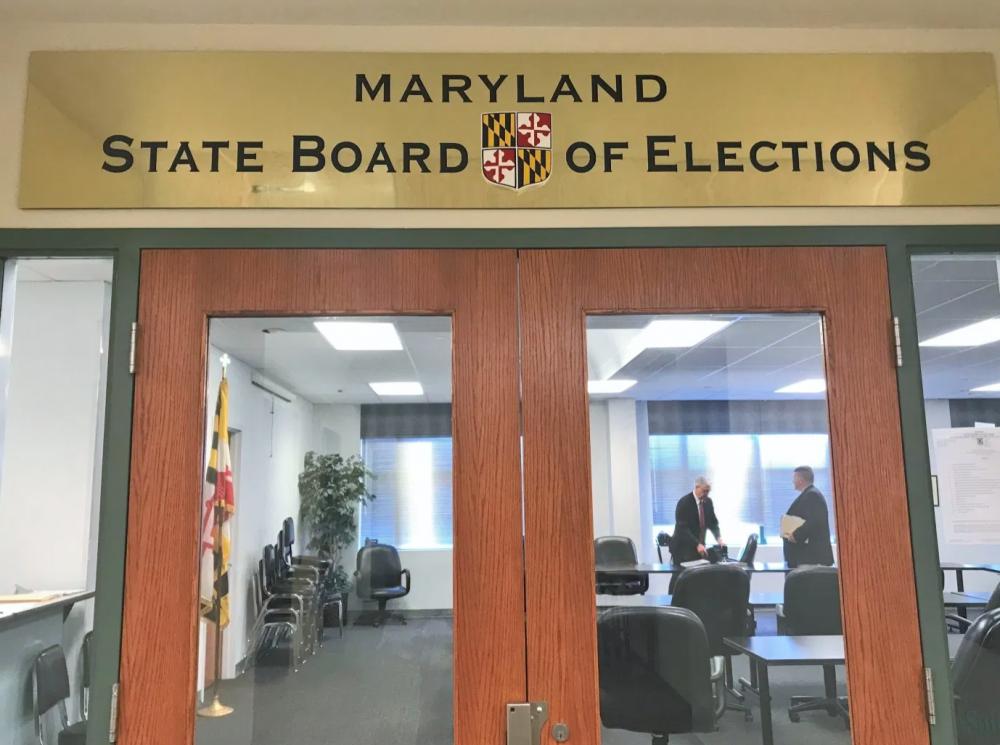Citing public health concerns and an inability to protect the safety of poll workers and voters, Maryland’s State Board of Elections voted Wednesday to avoid any in-person voting for the special election in the 7th congressional district next month.
Gov. Lawrence J. Hogan Jr. earlier this month directed the state elections office to move forward with mail-in ballots for the election to fill the vacancy of the late Rep. Elijah E. Cummings. Officials were contemplating one voting center each in the jurisdictions that make up the district ― Baltimore City and Howard and Baltimore counties. But state board members said public health concerns overwhelmed other reasons for opening voting centers, including providing access for individuals with disabilities or limited access to postal services.
The board also directed state election officials to move forward with a mail-only plan for the postponed presidential primary election now scheduled for June 2. Elections officials must present Hogan with a plan for conducting that election by next Friday, according to a proclamation the governor issued March 17.
Despite lengthy deliberation during a teleconference, the board was ultimately unanimous in its decision to avoid all in-person voting “in light of the state of emergency and catastrophic health emergency.”
A major consideration was to avoid voting centers becoming hubs for transmission of COVID-19. There were 580 confirmed diagnoses of the novel coronavirus in Maryland as of Wednesday morning, but that figure is expected to climb as more patients are being tested and as the disease spreads.
Webster Ye, from the Maryland Department of Health, took part in the elections board meeting to advise officials about best practices to avoid community spread of the virus that has claimed more than 20,000 lives worldwide.
Ye told board members that current modeling indicates COVID-19 cases will peak in Maryland around July 4. The number of confirmed coronavirus diagnoses in the state could hit 1,800 by April 1, he said.
Board members expressed concern that opening polling places ― particularly with many of the state’s volunteer election judges being retirees ― could put workers and voters in an unhealthy situation.
“We don’t know what it’s going to be like on April 28. We can’t protect the public, the volunteers or the staff,” Board Chairman Michael R. Cogan said Wednesday.
Ye said the state, which is facing a shortage of personal protective equipment like masks, googles and gloves for healthcare workers, wouldn’t be able to provide complete protection for election workers if polling places are opened.
Maryland’s Deputy Election Administrator Nikki Charlson said local officials were already reporting a 20% vacancy rate for Election Day judges and that vacant positions were expected to climb with the infection rate.
Establishing voting centers was also complicated by the fact that many sites generally used for polling places ― schools, libraries or senior centers ― have been closed.
The board also voted Wednesday to repeal a state regulation requiring a mailing about same-day voter registration for the April and June elections, in light of changes to the voting process and because Maryland Correctional Enterprises, which had been contracted to send the postcard, had curtailed its workforce and is unable to meet the deadline.
However, the voter registration deadline for the April 28 election has been extended to April 21.
Voters can check their current registration information here. Changes can be made here.
For the April 28 election, the state will send pre-paid absentee ballots to all voters in the 7th District.
Other election processes for April and June still have to be worked out, including how election judges will be able to safely count mailed-in ballots without overcrowding local elections offices or closing off access to public observers.
The canvassing process to count mail-in ballots is a very labor-intensive process, Charlson said, and standard practices now “violate all of the social distancing guidelines.”
The board will consider allowing local elections offices to extend the typical 10-day deadline for finishing the canvass, and local elections offices are working together to develop safety guidelines.
The state board is expected to meet again next Thursday before formally presenting a proposal for conducting the June 2 elections to the governor on Friday.
By Danielle E. Gaines


